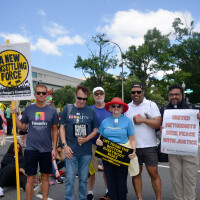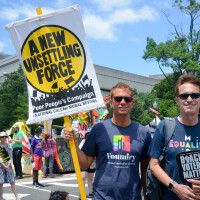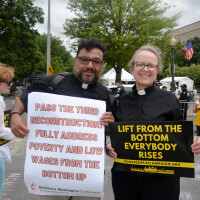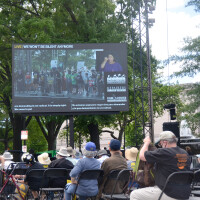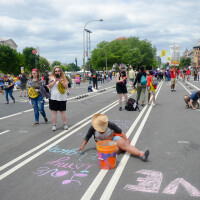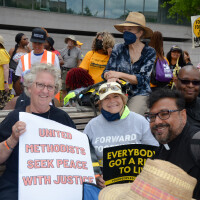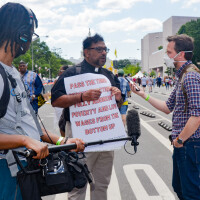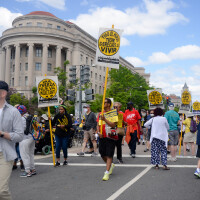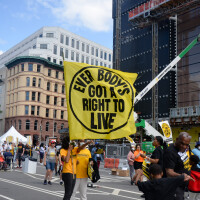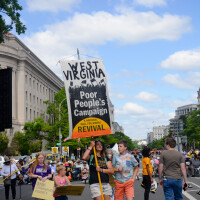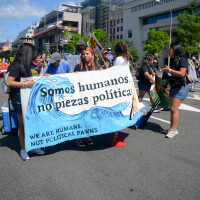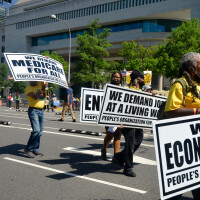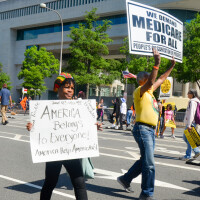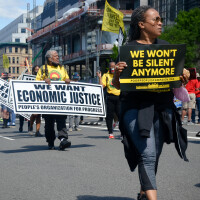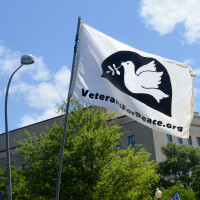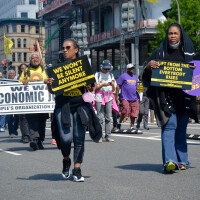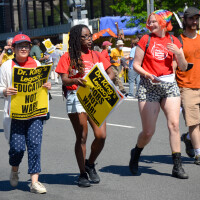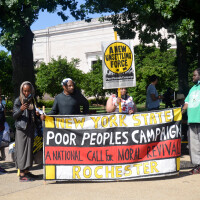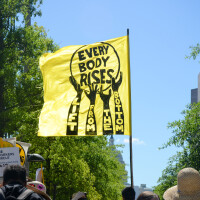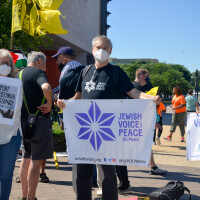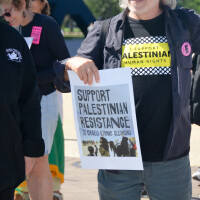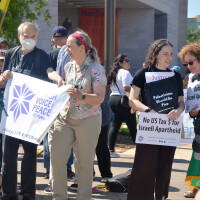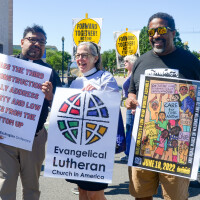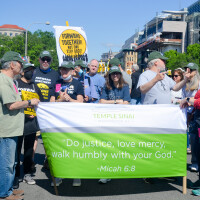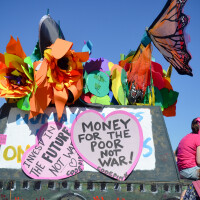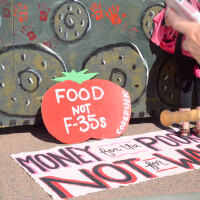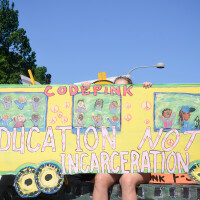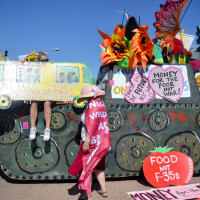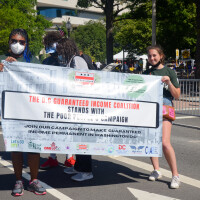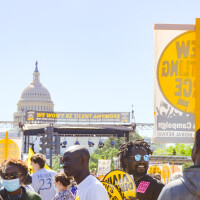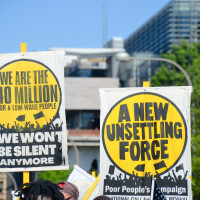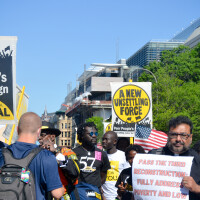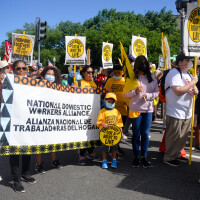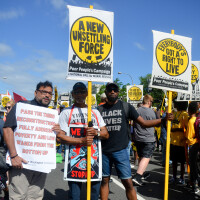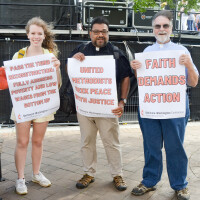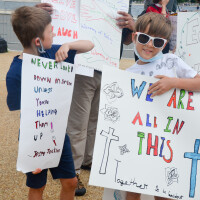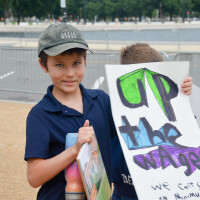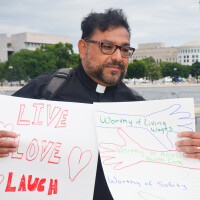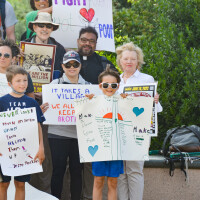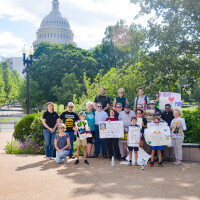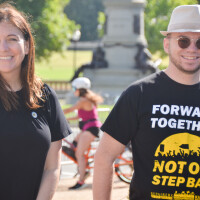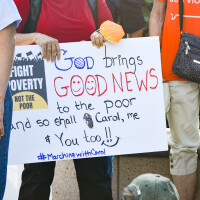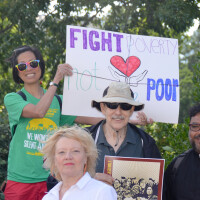D.C. March calls for economic equity for all
By Calia Christie
Learn more and take action
- Sign up to take Action through Baltimore Washington Conference Legislative Action Alerts!
- United Methodist Social Principles: Economic Community
- Learn more about the Third Reconstruction to fully address poverty and low wages from the bottom up
- Poor People's Campaign Policy Priorities
- Watch the Mass Poor People’s & Low-Wage Workers’ Assembly and Moral March
Congregations from across the Baltimore-Washington Conference joined thousands of people of faith from across the nation for the Mass Poor People’s & Low-Wage Workers’ Assembly and Moral March on June 18. Joyous music and profound speech filled the streets. Activists, laity, and clergy passed across a stage, sharing stories of challenging childhoods, terrified school children, and underfunded communities.
Poor People's March
There was a shared sense of exhaustion in this space- a feeling that oddly enough invited invigoration. Everyone in attendance knew that there was still a long road ahead, and that this exhaustion would only be soothed by community-wide strength. The speakers represented people who have too often been tossed aside by our political and economic systems and left to work two and three jobs to feed and clothe their children. These voices brought urgency to the movement, reminding us that unless we do our part to make a difference, and work for increased wages, and social infrastructure people will continue to suffer.
After each prayer or remark a spirit of hope emerged stronger, this day a long-awaited wakeup call and reset for a silenced and struggling America. “How in good faith can we rationalize 140 million of God’s people—each made in the image of God--continuing to live in chronic cycles of poverty when we are the wealthiest and most powerful nation in history? The UM Social Principles say, “We claim all economic systems to be under the judgment of God no less than other facets of the created order. We support measures that would reduce the concentration of wealth in the hands of a few.”
Marchers understood that this was a call to intersectional commitment, the goal of the March to lift all people by challenging the interlocking injustices of systemic racism, poverty, ecological devastation, the war economy, and the false moral narrative of religious nationalism.
D.C. has a budget of 19.5 billion dollars. Despite this generous number so many residents live below the poverty line or have little to no access to fresh food. Food deserts cover this city, and social infrastructure that could support communities in need seem nonexistent. 9.9 percent of people in Maryland live below the poverty line - $24,300 for a family of four. Sixteen percent live in poverty in West Virginia.
The Rev. Jessica S. Hayden of Randall from Memorial UMC, s in Ward 7 of Washington, D.C. explained the church is located in Deanwood, which is a food desert. Many residents of Deanwood suffer from food insecurity. “Our compassion ministries provide food, and these ministries have been in place for over ten years. One of the newest ministries that responds to food insecurity is H.O.P.E. which stands for Helping Other People Eat. Within this first year, it grew to helping 30-40 families per month. She said, “At the same time, we were gathered for the March our team sponsored approximately 100 individuals with food and household items. We continue to faithfully engage in ministries of compassion that help to alleviate the suffering of others and I believe God is now calling us to move into ministries of Justice that seek to disrupt and dismantle systems of oppression that allow such suffering to exist in the first place.”
“I am part of the March because in a District and a country with as many resources as ours it is unacceptable that there are millions of people in poverty” said Madison Crum, a member of Foundry UMC in Washington, D.C. and an accountant by profession. “It is possible for everyone to earn a living wage and healthcare must be provided for all. Each of us must stay engaged with their representatives and vote to ensure that local and national budgets are moral and reflect our shared humanity.” His words inspire movement, we can contact community leaders and government representatives and participate in this change.
During the March it became clear that poverty will go beyond access to food. Poverty dips into every inch of our social fabric, education a prime target. Lynne Hunter from Grace UMC in Winfield, Kansas, in the Great Plains Conference, shared her experience saying, “I’m a retired public-school teacher. I’m passionate about people being treated fairly, and that means justice for all. I can now rally at the national level now because my dad died, and I can afford it when I couldn’t before. I can take a stronger stand because my career is secure. And, as a United Methodist, I believe I should work towards loving others and that means helping us move towards a country that provides jobs, healthcare, a healthy environment, and immigration reform for those who are in need.”
The following are quotes gathered from others in attendance at Saturday’s march. These words remind us of why we continue to push forward. There is no progress without community, empathy, compassion, and strength.
I am part of the March because in a District and a country with as many resources as ours it is unacceptable that there are millions of people in poverty. As an accountant, I believe that it is possible for everyone to earn a living wage and healthcare must be provided for all. Each of us must stay engaged with their representatives and vote to ensure that local and national budgets are moral and reflect our shared humanity. -- Madison Crum, Foundry UMC and Ward 2 resident, Washington, D.C.
I’m a retired public-school teacher. I’m passionate about people being treated fairly, and that means “justice for all”. I can now rally at the national level now because my dad died and I can afford it when I couldn’t before. I can take a stronger stand because my career is secure. And, as a United Methodist, I believe I should work towards loving others and that means helping us move towards a country that provides jobs, healthcare, a healthy environment, and immigration reform for those who are in need. -- Lynne Hunter, Grace UMC, Winfield, KS, Great Plains Conference
One speaker talked about the challenges of food deserts in our communities. Randall Memorial UMC resides in Ward 7 of Washington DC in the community of Deanwood which is a food desert. Many of the residents suffer from food insecurity. Our compassion ministries provide food and these ministries have been in place for over 10 years. One of the newest ministries that responds to food insecurity is H.O.P.E. which stands for Helping Other People Eat. Within this first year, it grew to helping 30-40 families per month. At the same time, we were gathered for the March, members of our team were at the church sponsoring the summer where approximately 100 individuals were blessed with free food and household items. We continue to faithfully engage in ministries of compassion that help to alleviate the suffering of others and I believe God is now calling us to move into ministries of Justice that seek to disrupt and dismantle systems of oppression that allow such suffering to exist in the first place. -- Rev. Jessica S. Hayden, Randall Memorial United Methodist Church, Washington, D.C.
I am active in the Poor People’s Campaign because of the way it connects justice issues and brings people together for effective advocacy. As a follower of Jesus, I am committed to addressing poverty and the Poor People’s Campaign does this clearly in setting a new moral agenda for the country. It was energizing to be at the Washington gathering with so many people lifting their voices and demanding changes in our country’s priorities. -- Rev. Kathryn Johnson, New England Conference, Mass.
I marched because I am impacted by sexism, poverty, and homophobia. Many of my friends from California marched because they are undocumented. There were 100 people from California with me. All of us are impacted by systemic injustices and it is time to say no more. This mass Assembly was a visual statement to politicians and others in power that we are here and we are ready to work for an equitable society. - Kelly Ports, Nestor UMC, California Pacific Conference, and college student, San Diego City College, Elementary Education major
It was important for me to be at the March because I needed to hear the stories of how poverty and other human rights abuses have impacted the people who shared today. It was important to be with people from many backgrounds and be encouraged by their presence and be part of a larger United Methodist presence. It encourages me not to fall into complicity but to continue to seek solutions that can create systemic change and to be alert to specific recommendations on levitative initiatives. I am angered by the obstacles put in the way of people to vote from ex-offenders who have served their time but still are not allowed to vote, to those who find it difficult to get at a voting booth because of lack of access, etc. It is hard to believe that these obstacles are legally permitted. -- John Hochevar, Covenant UMC, MD
As a public theologian, it was so important to me to make sure that in some way I participated and helped others as well. As Bishop Barber says, ‘this is not just a March, it’s a movement’. The goals of the Poor People’s campaign are to work to get rid of poverty in this country. As United Methodists we are guided by our Social Principles to ensure a just world. I was privileged to host a watch party with the BWC and Wesley Theological Seminary. This watch party allowed those unable to be there live to watch and discuss together. We offered tools about how congregations can get involved with the campaign and help with systemic injustice and its effects in their communities. Post march, we are concentrating on the upcoming elections. It is our goal to make sure all who can are registered and have transportation to the polls. This March was a reminder of the work we still have to do with economics, climate, and racial justice in our communities. We also saw that there is a multi-ethnic, multicultural, multi-religious coalition working to bring change. It will take all of us to make this country just for all. -- Rev. Rochelle Andrews, Executive Director, Solomons Mission Center, MD
I went to support the vision of the Poor People’s Campaign in 1968, and the continued need for it today. Racial Justice is the issue I’m most passionate about, and the intersections of poverty, race and our country’s military spending. - Rev. Andy Peck McClain, Washington Grove UMC, MD
I came to the Poor People’s Campaign to remember that the movement to be faithful to Jesus by seeking social transformation is alive and well. Standing amidst thousands of people, uplifting the voices of the overlooked members of our society, and collectively dreaming of a future for our country that aligns with God’s Kingdom of abundant life for everyone - gives me hope and inspiration to return to the work to seek justice, and confront powers and principalities. - Pastor Will Newton, St. Paul UMC, Laytonsville, MD
I came because I wanted to join with others to work for justice for all people, but especially for those God loves and calls us to watch over and care for…the poor. And I was blessed by the stories of so many: the woman who spent eight extra years in jail because her file was lost, the man who lost three young adult children to suicide, the father worried he wouldn’t be able to feed his infant because of WIC cuts. The diversity of the crowd was beautiful, and I was blessed to be a part of it. -- Rev. Dawn Stewart, Covenant UMC, MD
I decided to attend the Poor People’s and Low-Wage Workers’ Assembly and Moral March on Washington and to the polls because, for many years I have felt a deep conviction that much of the injustice in the United States is based, in large part, upon economic inequality. While I have never fit the legal definition of poor, I have spent time living paycheck to paycheck and deciding whether bills got paid or gas got put in the car to go to work. Later in life, I realized that those struggles that I faced in my early adult life were nothing compared to the struggles of a family of four with two parents working minimum wage jobs, with no healthcare and little opportunity for advancement. And all of this, in the richest, most prosperous country in the history of the planet. Offering support to this worthy cause, in the name of the God that I serve, was the very least that I could do, and I pray that there will be many more opportunities for the people called United Methodists to bear witness to the need for aggressive, systemic changes that bring about equity in both income and opportunity. -- Rev. William Carpenter, Chair BWC Racial Justice Team, Associate Pastor - Greater Brunswick Charge, MD
"How in good faith can we rationalize 140 million of God’s people—each made in the image of God--continuing to live in chronic cycles of poverty when we are the wealthiest and most powerful nation in history? As a child of immigrants, I take seriously the UM Social Principle that says, “We claim all economic systems to be under the judgment of God no less than other facets of the created order. We support measures that would reduce the concentration of wealth in the hands of a few.” James 5:4, “Listen! The wages of the laborers who mowed your fields, which you kept back by fraud, cry out, and the cries of the harvesters have reached the ears of the Lord of hosts.” This is not about a scarcity of lack of resources but decisions we make about the equitable distribution of the abundance of our national wealth so that all communities can thrive. The persistence of poverty-making policies diminishes us all. The needs of the poor and suffering take priority over the aspirations of the economically wealthy. We cannot rest until we reset our values and refocus our public will on policies that we know will reduce the gross division between rich and poor and meet the pressing needs of the most vulnerable among us. Half our nation’s discretionary is spent on weapons of war while 140 million people who work low-wage jobs, daily struggle with food insecurity and lack of access to health care. Our spiritual and moral health is reflected in how we pursue just public policies that make a more equitable life for all of us. -- Rev. Neal Christie, Executive Minister for Connected Engagement
#ForwardTogether #Notonestepback

